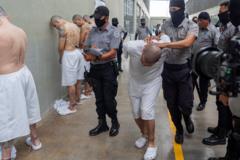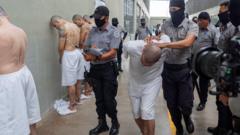The US has deported 17 alleged gang members to El Salvador amidst ongoing legal challenges and political tensions, with Secretary of State Marco Rubio labeling them as "murderers and rapists."
Tensions Rise as US Continues Gang Member Deportations to El Salvador

Tensions Rise as US Continues Gang Member Deportations to El Salvador
Recent deportations of alleged gang affiliates stir controversy and legal dilemmas in the US and El Salvador.
The US government has carried out the deportation of 17 individuals claimed to be affiliated with notorious gangs, primarily MS-13 and Tren de Aragua, to El Salvador, as confirmed by the State Department. This decision comes despite significant legal hurdles regarding the use of the Alien Enemies Act, a law historically applied during wartime.
On Monday, US Secretary of State Marco Rubio announced the deportation, emphasizing the severity of the individuals' crimes but withholding specific details or names. Salvadoran authorities have indicated the group includes both Salvadorans and Venezuelans. A prior court ruling had temporarily halted deportations under this law, which Trump invoked earlier this month for the removal of over 100 Venezuelan nationals, leading to legal challenges from the American Civil Liberties Union and other advocacy groups.
In a notable response, El Salvador's President Nayib Bukele released an edited video showcasing the deportees arriving at a mega-prison, claiming they are all confirmed murderers and some are child rapists, reflecting the government’s hardline stance on crime. The deportation initiative is framed as part of a strategy against organized crime, with El Salvador receiving a financial incentive of $6 million to assist in these efforts.
Family members of previously deported individuals have vehemently denied any connections to gang activity, arguing that the government’s labeling is unjust. Despite ongoing legal disputes regarding their rights, courts have thus far allowed these operations to persist, showing a complex interplay between law, immigration, and international relations as tensions between the US and El Salvador continue to mount.
Further hearings regarding the implications of these deportations are forthcoming, with public scrutiny remaining high as advocates call for due process for those affected by these legal moves.



















